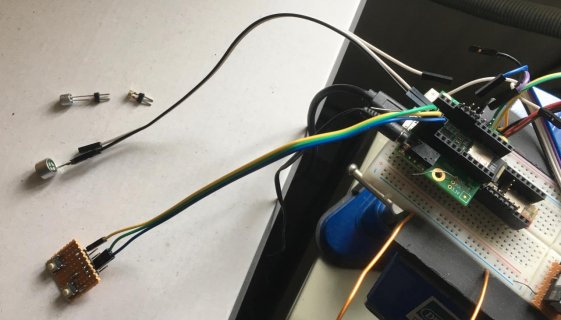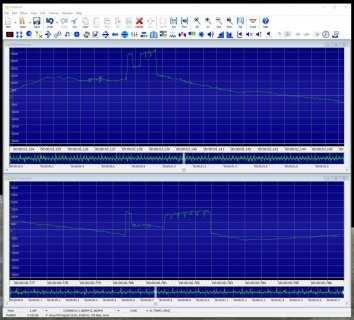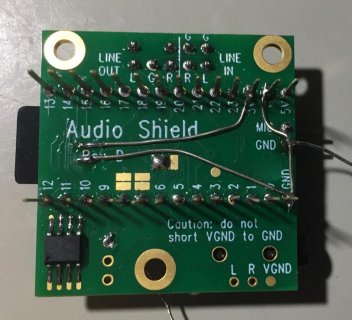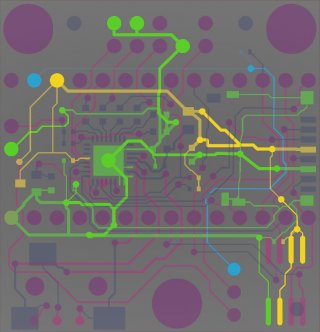/**
* Audio Guestbook, Copyright (c) 2022 Playful Technology
*
* Tested using a Teensy 4.0 with Teensy Audio Shield, although should work
* with minor modifications on other similar hardware
*
* When handset is lifted, a pre-recorded greeting message is played, followed by a tone.
* Then, recording starts, and continues until the handset is replaced.
* Playback button allows all messages currently saved on SD card through earpiece
*
* follow the detailed instructions here:
* https://github.com/DD4WH/audio-guest...main/README.md
*
*
* the sketch only works with the latest Teensyduino 1.57 version, so please update your Arduino IDE AND your Teensyduino to Arduino version 1.8.19 and the latest Teensyduino version 1.57
* download the following library, unzip it and put it into your local Arduino folder (on my computer, the local Arduino folder is: "C:/Users/DD4WH/Documents/Arduino/libraries/"): https://github.com/KurtE/MTP_Teensy
* compile with option: "Serial + MTP Disk (Experimental)"" and with option "CPU speed: 150MHz" (this can save about 70% of battery power)
*
* Modifications by Frank DD4WH, August 2022
* - now uses a Teensy 4.1 with built-in SD card (faster via SDIO), if you want to use a Teensy 4.0, uncomment in the USER CONFIGURATION below
* - Files are saved on SD card as 44.1kHz, 16-bit mono WAV audio files
* - if you plug in the telephones´ USB cable into your computer, the telephone is mounted as a drive and you can acess the recordings
* - if there is no "greeting.wav" message on the SD card, the telephone automatically plays an invitation to record this message and then you can record the greeting message
* - if you want to record the greeting message again, just delete it from the telephone and lift the handheld again to record the greeting message
* --> if your handheld contact switch opens on lifting, simply uncomment in the USER CONFIGURATION below, everything else is done by the software
*
* GNU GPL v3.0 license
*
*/
#include <Bounce.h>
#include <Audio.h>
#include <Wire.h>
#include <SPI.h>
#include <SD.h>
#include <TimeLib.h>
#include <MTP_Teensy.h> // this library has to be downloaded separately (https://github.com/KurtE/MTP_Teensy)
// unzip the downloaded file and its content into your local Arduino folder (on my computer, the local Arduino folder is: "C:/Users/DD4WH/Documents/Arduino/libraries/")
/***************************************************************************************************************************************************/
/**USER CONFIGURATION ******************************************************************************************************************************/
/**COMMENT / UNCOMMENT ACCORDING TO YOUR HARDWARE **************************************************************************************************/
/***************************************************************************************************************************************************/
// comment this out, if your handheld OPENS the contact on lift
// use a digital voltmeter to find out
#define HANDHELD_CLOSES_ON_LIFT
// comment this out, if you want to record your greeting message with an external recorder
// leave as-is if you want to have the telephone automatically switch to recording the greeting message, in case there is no "greeting.wav" on the SD card
//#define AUTO_GREETING_MESSAGE
// comment out, if you use a Teensy 4.0 (and thus the SD card slot on the audio board)
// if you leave this as-is, you have to use the built-in SD card slot on the Teensy 4.1, NOT the SD card slot on the audio board
//#define TEENSY_41
/***************************************************************************************************************************************************/
/**END OF USER CONFIGURATION ***********************************************************************************************************************/
/***************************************************************************************************************************************************/
/***************************************************************************************************************************************************/
// Define pins used by Teensy Audio Shield
#ifdef TEENSY_41
#define SDCARD_CS_PIN BUILTIN_SDCARD
#else
#define SDCARD_CS_PIN 10
#endif
#define SDCARD_MOSI_PIN 7
#define SDCARD_SCK_PIN 14
// And those used for inputs
// You can choose the pins you use here:
#define HOOK_PIN 0
#define PLAYBACK_BUTTON_PIN 1 // SM: no replay
//#define HOOK_PIN 0 // this is the default
//#define PLAYBACK_BUTTON_PIN 1 // this is the default
// GLOBALS
// Audio initialisation code can be generated using the GUI interface at https://www.pjrc.com/teensy/gui/
// Inputs
AudioSynthWaveform waveform1; // To create the "beep" sfx
AudioInputI2S i2s2; // I2S input from microphone on audio shield
AudioPlaySdWav playWav1; // Play 44.1kHz 16-bit PCM greeting WAV file
AudioRecordQueue queue1; // Creating an audio buffer in memory before saving to SD
AudioMixer4 mixer; // Allows merging several inputs to same output
AudioOutputI2S i2s1; // I2S interface to Speaker/Line Out on Audio shield
AudioConnection patchCord1(waveform1, 0, mixer, 0); // wave to mixer
AudioConnection patchCord3(playWav1, 0, mixer, 1); // wav file playback mixer
AudioConnection patchCord4(mixer, 0, i2s1, 0); // mixer output to speaker (L)
AudioConnection patchCord6(mixer, 0, i2s1, 1); // mixer output to speaker (R)
AudioConnection patchCord5(i2s2, 0, queue1, 0); // mic input to queue (L)
AudioControlSGTL5000 sgtl5000_1;
// Filename to save audio recording on SD card
char filename[15];
// The file object itself
File frec;
// Use long 40ms debounce time on both switches
Bounce buttonRecord = Bounce(HOOK_PIN, 0);
Bounce buttonPlay = Bounce(PLAYBACK_BUTTON_PIN, 1);
// Keep track of current state of the device
enum Mode {Initialising, Ready, Prompting, Recording, Playing, Recording_Greeting};
Mode mode = Mode::Initialising;
float beep_volume = 0.04f; // not too loud :-)
// variables for writing to WAV file
unsigned long ChunkSize = 0L;
unsigned long Subchunk1Size = 16;
unsigned int AudioFormat = 1;
unsigned int numChannels = 1;
unsigned long sampleRate = 44100;
unsigned int bitsPerSample = 16;
unsigned long byteRate = sampleRate*numChannels*(bitsPerSample/8);// samplerate x channels x (bitspersample / 8)
unsigned int blockAlign = numChannels*bitsPerSample/8;
unsigned long Subchunk2Size = 0L;
unsigned long recByteSaved = 0L;
unsigned long NumSamples = 0L;
byte byte1, byte2, byte3, byte4;
void setup() {
Serial.begin(9600);
while (!Serial && millis() < 5000) {
// wait for serial port to connect.
}
Serial.println("Serial set up correctly");
print_mode();
// Configure the input pins
pinMode(HOOK_PIN, INPUT_PULLUP);
pinMode(PLAYBACK_BUTTON_PIN, INPUT_PULLUP);
// Audio connections require memory, and the record queue
// uses this memory to buffer incoming audio.
AudioMemory(60);
// Enable the audio shield, select input, and enable output
sgtl5000_1.enable();
// Define which input on the audio shield to use (AUDIO_INPUT_LINEIN / AUDIO_INPUT_MIC)
sgtl5000_1.inputSelect(AUDIO_INPUT_MIC);
sgtl5000_1.adcHighPassFilterDisable(); //
sgtl5000_1.volume(0.85);
mixer.gain(0, 1.0f);
mixer.gain(1, 1.0f);
// Play a beep to indicate system is online
waveform1.begin(beep_volume, 440, WAVEFORM_SINE);
wait(1000);
waveform1.amplitude(0);
delay(1000);
// Initialize the SD card
#ifndef TEENSY_41 // assumes that you are using the SD card slot of the AUDIO BOARD
SPI.setMOSI(SDCARD_MOSI_PIN);
SPI.setSCK(SDCARD_SCK_PIN);
#endif
if (!(SD.begin(SDCARD_CS_PIN)))
{
// stop here if no SD card, but print a message
while (1) {
Serial.println("Unable to access the SD card");
delay(500);
}
}
else Serial.println("SD card correctly initialized");
// mandatory to begin the MTP session.
MTP.begin();
// Add SD Card
MTP.addFilesystem(SD, "LONDON"); // choose a nice name for the SD card volume to appear in your file explorer
Serial.println("Added SD card via MTP");
// Value in dB
sgtl5000_1.micGain(25); //SM: default war 15. Mit neuem Mikrophon auf 25 erhöht.
// sgtl5000_1.micGain(10); // much lower gain is required for the AOM5024 electret capsule
// Synchronise the Time object used in the program code with the RTC time provider.
// See https://github.com/PaulStoffregen/Time
setSyncProvider(getTeensy3Time);
// Define a callback that will assign the correct datetime for any file system operations
// (i.e. saving a new audio recording onto the SD card)
FsDateTime::setCallback(dateTime);
mode = Mode::Ready; print_mode();
}
void loop() { //1
// First, read the buttons
buttonRecord.update();
buttonPlay.update();
switch(mode)
{ //2
case Mode::Ready:
// Falling edge occurs when the handset is lifted --> 611 telephone
#if defined(HANDHELD_CLOSES_ON_LIFT)
if (buttonRecord.fallingEdge())
#else
if (buttonRecord.risingEdge())
#endif
{
Serial.println("Handset lifted");
mode = Mode::Prompting; print_mode();
} //3
else if(buttonPlay.fallingEdge())
{ //4
playAllRecordings();
//playLastRecording();
} //4
break;
case Mode::Prompting:
// Wait a second for users to put the handset to their ear
wait(1000);
#if defined(AUTO_GREETING_MESSAGE)
if (!SD.exists("greeting.wav"))
{ //5
mode = Mode::Recording_Greeting;
break;
} //5
#endif
// Play the greeting inviting them to record their message
playWav1.play("greeting.wav");
// Wait until the message has finished playing
// while (playWav1.isPlaying()) {
while (!playWav1.isStopped())
{ //6
// Check whether the handset is replaced
buttonRecord.update();
buttonPlay.update();
// Handset is replaced
#if defined(HANDHELD_CLOSES_ON_LIFT)
if (buttonRecord.risingEdge())
#else
if (buttonRecord.fallingEdge())
#endif
{
playWav1.stop();
mode = Mode::Ready; print_mode();
return;
} //7
if(buttonPlay.fallingEdge())
{ //8
playWav1.stop();
playAllRecordings();
//playLastRecording();
return;
} //8
} //
// Debug message
Serial.println("Starting Recording");
// Play the tone sound effect
waveform1.begin(beep_volume, 440, WAVEFORM_SINE);
wait(1250);
waveform1.amplitude(0);
// Start the recording function
startRecording();
break;
case Mode::Recording:
// Handset is replaced
#if defined(HANDHELD_CLOSES_ON_LIFT)
if (buttonRecord.risingEdge())
#else
if (buttonRecord.fallingEdge())
#endif
{ //9
// Debug log
Serial.println("Stopping Recording");
// Stop recording
stopRecording();
// Play audio tone to confirm recording has ended
end_Beep();
} //9
else
{ //10
continueRecording();
} // 10
break;
case Mode::Playing: // to make compiler happy
break;
case Mode::Initialising: // to make compiler happy
break;
case Mode::Recording_Greeting: // to make compiler happy
startRecordingGreeting();
mode = Mode::Recording;
break;
} // 2 end switch
MTP.loop(); //This is mandatory to be placed in the loop code.
} // 1 end loop
void startRecordingGreeting() {
if (SD.exists("greeting.wav")) {
return;
}
// play message "Please record Greeting message now !"
playWav1.play("invitation_greeting.wav");
while (!playWav1.isStopped()) { // this works for playWav
buttonPlay.update();
buttonRecord.update();
// Button is pressed again
#if defined(HANDHELD_CLOSES_ON_LIFT)
if(buttonPlay.fallingEdge() || buttonRecord.risingEdge())
#else
if(buttonPlay.fallingEdge() || buttonRecord.fallingEdge())
#endif
{
playWav1.stop();
mode = Mode::Ready; print_mode();
return;
}
}
// play beep
two_tone_Beep();
frec = SD.open("greeting.wav", FILE_WRITE);
Serial.println("Opened Greeting file !");
if(frec) {
Serial.print("Recording to greeting.wav");
queue1.begin();
mode = Mode::Recording; print_mode();
recByteSaved = 0L;
}
else {
Serial.println("Couldn't open file to record!");
}
}
void startRecording() {
// Find the first available file number
// for (uint8_t i=0; i<9999; i++) { // BUGFIX uint8_t overflows if it reaches 255
for (uint16_t i=0; i<9999; i++) {
// Format the counter as a five-digit number with leading zeroes, followed by file extension
snprintf(filename, 11, " %05d.wav", i);
// Create if does not exist, do not open existing, write, sync after write
if (!SD.exists(filename)) {
break;
}
}
frec = SD.open(filename, FILE_WRITE);
Serial.println("Opened file !");
if(frec) {
Serial.print("Recording to ");
Serial.println(filename);
queue1.begin();
mode = Mode::Recording; print_mode();
recByteSaved = 0L;
}
else {
Serial.println("Couldn't open file to record!");
}
}
void continueRecording() {
// Check if there is data in the queue
if (queue1.available() >= 2) {
byte buffer[512];
// Fetch 2 blocks from the audio library and copy
// into a 512 byte buffer. The Arduino SD library
// is most efficient when full 512 byte sector size
// writes are used.
memcpy(buffer, queue1.readBuffer(), 256);
queue1.freeBuffer();
memcpy(buffer+256, queue1.readBuffer(), 256);
queue1.freeBuffer();
// Write all 512 bytes to the SD card
frec.write(buffer, 512);
recByteSaved += 512;
}
}
void stopRecording() {
// Stop adding any new data to the queue
queue1.end();
// Flush all existing remaining data from the queue
while (queue1.available() > 0) {
// Save to open file
frec.write((byte*)queue1.readBuffer(), 256);
queue1.freeBuffer();
recByteSaved += 256;
}
writeOutHeader();
// Close the file
frec.close();
Serial.println("Closed file");
mode = Mode::Ready; print_mode();
}
void playAllRecordings() {
// Recording files are saved in the root directory
File dir = SD.open("/");
while (true) {
File entry = dir.openNextFile();
if (strstr(entry.name(), "greeting"))
{
entry = dir.openNextFile();
}
if (!entry) {
// no more files
entry.close();
end_Beep();
break;
}
//int8_t len = strlen(entry.name()) - 4;
// if (strstr(strlwr(entry.name() + (len - 4)), ".raw")) {
// if (strstr(strlwr(entry.name() + (len - 4)), ".wav")) {
// the lines above throw a warning, so I replace them with this (which is also easier to read):
if (strstr(entry.name(), ".wav") || strstr(entry.name(), ".WAV")) {
Serial.print("Now playing ");
Serial.println(entry.name());
// Play a short beep before each message
waveform1.amplitude(beep_volume);
wait(750);
waveform1.amplitude(0);
// Play the file
playWav1.play(entry.name());
mode = Mode::Playing; print_mode();
}
entry.close();
// while (playWav1.isPlaying()) { // strangely enough, this works for playRaw, but it does not work properly for playWav
while (!playWav1.isStopped()) { // this works for playWav
buttonPlay.update();
buttonRecord.update();
// Button is pressed again
#if defined(HANDHELD_CLOSES_ON_LIFT)
if(buttonPlay.fallingEdge() || buttonRecord.risingEdge())
#else
if(buttonPlay.fallingEdge() || buttonRecord.fallingEdge())
#endif
{
playWav1.stop();
mode = Mode::Ready; print_mode();
return;
}
}
}
// All files have been played
mode = Mode::Ready; print_mode();
}
void playLastRecording() { // 1
// Find the first available file number
uint16_t idx = 0;
for (uint16_t i=0; i<9999; i++) { // 2
// Format the counter as a five-digit number with leading zeroes, followed by file extension
snprintf(filename, 11, " %05d.wav", i);
// check, if file with index i exists
if (!SD.exists(filename)) { // 3
idx = i - 1;
break;
} // 3
} // 2
// now play file with index idx == last recorded file
snprintf(filename, 11, " %05d.wav", idx);
Serial.println(filename);
playWav1.play(filename);
mode = Mode::Playing; print_mode();
while (!playWav1.isStopped())
{ // 5 // this works for playWav
buttonPlay.update();
buttonRecord.update();
// Button is pressed again
#if defined(HANDHELD_CLOSES_ON_LIFT)
if(buttonPlay.fallingEdge() || buttonRecord.risingEdge())
#else
if(buttonPlay.fallingEdge() || buttonRecord.fallingEdge())
#endif
{
playWav1.stop();
mode = Mode::Ready; print_mode();
return;
} //4
} // 5 end while
// file has been played
mode = Mode::Ready; print_mode();
end_Beep();
} // 1 end playLastRecording
// Retrieve the current time from Teensy built-in RTC
time_t getTeensy3Time(){
return Teensy3Clock.get();
}
// Callback to assign timestamps for file system operations
void dateTime(uint16_t* date, uint16_t* time, uint8_t* ms10) {
// Return date using FS_DATE macro to format fields.
*date = FS_DATE(year(), month(), day());
// Return time using FS_TIME macro to format fields.
*time = FS_TIME(hour(), minute(), second());
// Return low time bits in units of 10 ms.
*ms10 = second() & 1 ? 100 : 0;
}
// Non-blocking delay, which pauses execution of main program logic,
// but while still listening for input
void wait(unsigned int milliseconds) {
elapsedMillis msec=0;
while (msec <= milliseconds) {
buttonRecord.update();
buttonPlay.update();
if (buttonRecord.fallingEdge()) Serial.println("Button (pin 0) Press");
if (buttonPlay.fallingEdge()) Serial.println("Button (pin 1) Press");
if (buttonRecord.risingEdge()) Serial.println("Button (pin 0) Release");
if (buttonPlay.risingEdge()) Serial.println("Button (pin 1) Release");
}
}
void writeOutHeader() { // update WAV header with final filesize/datasize
// NumSamples = (recByteSaved*8)/bitsPerSample/numChannels;
// Subchunk2Size = NumSamples*numChannels*bitsPerSample/8; // number of samples x number of channels x number of bytes per sample
Subchunk2Size = recByteSaved;
ChunkSize = Subchunk2Size + 36;
frec.seek(0);
frec.write("RIFF");
byte1 = ChunkSize & 0xff;
byte2 = (ChunkSize >> 8) & 0xff;
byte3 = (ChunkSize >> 16) & 0xff;
byte4 = (ChunkSize >> 24) & 0xff;
frec.write(byte1); frec.write(byte2); frec.write(byte3); frec.write(byte4);
frec.write("WAVE");
frec.write("fmt ");
byte1 = Subchunk1Size & 0xff;
byte2 = (Subchunk1Size >> 8) & 0xff;
byte3 = (Subchunk1Size >> 16) & 0xff;
byte4 = (Subchunk1Size >> 24) & 0xff;
frec.write(byte1); frec.write(byte2); frec.write(byte3); frec.write(byte4);
byte1 = AudioFormat & 0xff;
byte2 = (AudioFormat >> 8) & 0xff;
frec.write(byte1); frec.write(byte2);
byte1 = numChannels & 0xff;
byte2 = (numChannels >> 8) & 0xff;
frec.write(byte1); frec.write(byte2);
byte1 = sampleRate & 0xff;
byte2 = (sampleRate >> 8) & 0xff;
byte3 = (sampleRate >> 16) & 0xff;
byte4 = (sampleRate >> 24) & 0xff;
frec.write(byte1); frec.write(byte2); frec.write(byte3); frec.write(byte4);
byte1 = byteRate & 0xff;
byte2 = (byteRate >> 8) & 0xff;
byte3 = (byteRate >> 16) & 0xff;
byte4 = (byteRate >> 24) & 0xff;
frec.write(byte1); frec.write(byte2); frec.write(byte3); frec.write(byte4);
byte1 = blockAlign & 0xff;
byte2 = (blockAlign >> 8) & 0xff;
frec.write(byte1); frec.write(byte2);
byte1 = bitsPerSample & 0xff;
byte2 = (bitsPerSample >> 8) & 0xff;
frec.write(byte1); frec.write(byte2);
frec.write("data");
byte1 = Subchunk2Size & 0xff;
byte2 = (Subchunk2Size >> 8) & 0xff;
byte3 = (Subchunk2Size >> 16) & 0xff;
byte4 = (Subchunk2Size >> 24) & 0xff;
frec.write(byte1); frec.write(byte2); frec.write(byte3); frec.write(byte4);
frec.close();
Serial.println("header written");
Serial.print("Subchunk2: ");
Serial.println(Subchunk2Size);
}
void end_Beep(void) {
waveform1.frequency(523.25);
waveform1.amplitude(beep_volume);
wait(250);
waveform1.amplitude(0);
wait(250);
waveform1.amplitude(beep_volume);
wait(250);
waveform1.amplitude(0);
wait(250);
waveform1.amplitude(beep_volume);
wait(250);
waveform1.amplitude(0);
wait(250);
waveform1.amplitude(beep_volume);
wait(250);
waveform1.amplitude(0);
}
void two_tone_Beep(void) {
waveform1.frequency(523.25);
waveform1.amplitude(beep_volume);
wait(250);
waveform1.amplitude(0);
waveform1.frequency(375.0);
wait(250);
waveform1.amplitude(beep_volume);
wait(250);
waveform1.amplitude(0);
waveform1.frequency(523.25);
wait(250);
waveform1.amplitude(beep_volume);
wait(250);
waveform1.amplitude(0);
waveform1.frequency(375.0);
wait(250);
waveform1.amplitude(beep_volume);
wait(250);
waveform1.amplitude(0);
}
void print_mode(void) { // only for debugging
Serial.print("Mode switched to: ");
// Initialising, Ready, Prompting, Recording, Playing
if(mode == Mode::Ready) Serial.println(" Ready");
else if(mode == Mode::Prompting) Serial.println(" Prompting");
else if(mode == Mode::Recording) Serial.println(" Recording");
else if(mode == Mode::Playing) Serial.println(" Playing");
else if(mode == Mode::Initialising) Serial.println(" Initialising");
else if(mode == Mode::Recording_Greeting) Serial.println(" Recording Greeting");
else Serial.println(" Undefined");
}





